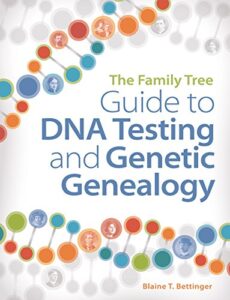 There is a lot I like about this book. And I have a few concerns. First, the positives . . .
There is a lot I like about this book. And I have a few concerns. First, the positives . . .
This book does a nice job of explaining complicated topics. It is pretty – it has an attractive layout and lots of illustrations. I love the famous examples such as with the Romanov family and Richard III. I also think the match worksheets in the back are interesting – a lot of us could probably be more organized with what we are doing and learning.
In addition, he does a great job of making the point that your genetic family tree is a subset of your genealogical family tree. People still might be your ancestors even if you don’t have any of their DNA. And we don’t share that much DNA with cousins either. While we share on average 50% atDNA (that is autosomal DNA) with a sibling, a parent or a child, we only share roughly 12.5% with a first cousin! (p.94) The charts and illustrations really help visualize these types of things.
My 3 areas of concern . . .
1) Money and choosing tests – If cost were not a factor, the advice is to do multiple tests, on all the people you can, at all 3 companies (p.211). At current prices at the time of this writing, that is $835 for a man and $476 for a woman (because you cannot do the Y-DNA test on women). Yowza. Scary! That is a lot and adds up fast for multiple people. Who can afford that?!
| Recommended Tests | Current Prices |
|---|---|
| Y-DNA (111 markers) @ FamilyTreeDNA | $359 |
| mtDNA (full) @ FamilyTreeDNA | $199 |
| atDNA @ FamilyTreeDNA | $79 |
| atDNA @ Ancestry | $99 |
| atDNA @ 23andMe | $99 ($199 if you want the health info) |
| Total | $835 (or $935 if you want the health info) |
The author does also acknowledge that cost is a factor for most of us and offers a flow chart to help decide, but I think a lot of people will still feel confused about what to do and feel restricted by the high costs.
2) Scientific validity – Ancestry in particular has really gotten people frustrated in this area in recent years and I haven’t seen anyone announce things are all better yet. For more info, see: Ethnicity Results – True or Not?
3) Privacy – Both Ancestry and 23andMe have in their terms that they can use your data for other research and they can sell your data and you can’t opt out. I haven’t seen anyone announce things are all better yet on this either. See the Cone of Shame section here: The Best and Worst of 2015 – Genetic Genealogy Year in Review
More resources on privacy since it is so important:
- Privacy info from ISOGG
- Privacy & GEDmatch (since it is a highly recommended tool as well)
And sadly, the book is already starting to get out of date since it is almost a year old. For more current information since the book was written and another perspective by a different author, see: 2016 Genetic Genealogy Retrospective
In summary, this book is great for someone wanting to better understand the science behind the DNA tests, but to help decide which tests to choose and which company to use, you probably want to do some additional reading, such as: